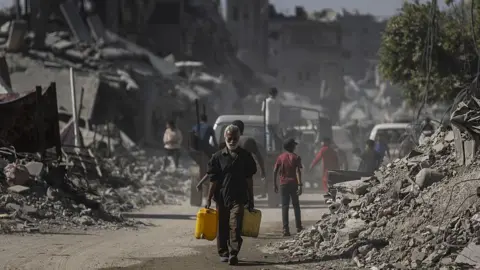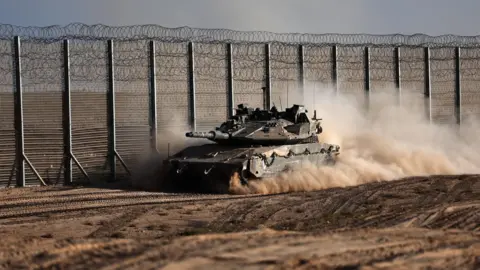 Anadolu via Getty Images
Anadolu via Getty ImagesUS Vice-President JD Vance has arrived in Israel as part of the Trump administration’s efforts to strengthen the Gaza ceasefire agreement.
He is expected to push the Israeli Prime Minister, Benjamin Netanyahu, to start negotiations on long-term issues for a permanent end to the war with Hamas.
The two special US envoys who helped negotiate the deal, Steve Witkoff and Jared Kushner, also held talks with Netanyahu on Monday.
Their visits come after a flare-up of violence on Sunday that threatened to derail the 12-day-old truce. Israel said a Hamas attack killed two soldiers, triggering Israeli air strikes which killed dozens of Palestinians.
US President Donald Trump insisted on Monday that the ceasefire was still on track but also warned Hamas that it would be “eradicated” if it violated the deal.
Trump is said to have dispatched his deputy and envoys to Israel to keep up the momentum and push for the start of talks on the second critical phase of his 20-point Gaza peace plan.
It would involve setting up an interim government in the Palestinian territory, deploying an international stabilisation force, the withdrawal of Israeli troops, and disarmament of Hamas.
Vance, Witkoff and Kushner are also attempting to ensure the ceasefire deal, which is based on the first phase of the peace plan, does not collapse first.
The New York Times cited US officials as saying they were concerned that Israel’s prime minister might “vacate” the deal and resume an all-out assault against Hamas.
Netanyahu told the Israeli parliament on Monday that he would discuss “security challenges” and “political opportunities” with Vance during his visit.
He also said Israeli forces had dropped 153 tonnes of bombs on Gaza in response to what he called a “blatant” breach of the ceasefire by Hamas on Sunday.
“One of our hands holds a weapon, the other hand is stretched out for peace,” he said. “You make peace with the strong, not the weak. Today Israel is stronger than ever before.”
The Israeli military blamed Hamas for an anti-tank missile attack on Sunday that killed two Israeli soldiers in southern Gaza and then carried out dozens of strikes across the territory which hospitals said killed at least 45 Palestinians.
Afterwards, the Israeli military said it was resuming enforcement of the ceasefire, while Hamas said it remained committed to the agreement.
However, four Palestinians were reportedly killed by Israeli fire east of Gaza City on Monday. The Israeli military said its troops fired towards ” terrorists” who crossed the agreed-upon ceasefire line in the Shejaiya area.
Later, Trump told reporters at the White House: “We made a deal with Hamas that they’re going to be very good. They’re going to behave. They’re going to be nice.”
“If they’re not, we’re going to go and we’re going to eradicate them, if we have to. They’ll be eradicated, and they know that,” he added.
 EPA
EPAHamas’s chief negotiator Khalil al-Hayya, who is in Cairo, meanwhile insisted that his group and other Palestinian factions were committed to the ceasefire deal and “determined to fully implement it until the end”.
“What we heard from the mediators and the US president reassures us that the war in Gaza is over,” he told Egypt’s Al-Qahera News TV .
Hayya also said Hamas was serious about handing over the bodies of all the deceased hostages still in Gaza despite facing what he described as “extreme difficulty” in its efforts to recover them under rubble because of a lack of specialist equipment.
Overnight, Israeli authorities confirmed that Hamas had handed over the body of another deceased Israeli hostage to the Red Cross in Gaza.
The remains were identified as those of Tal Haimi, 41, who the Israeli military said was killed in Kibbutz Nir Yitzhak during the Hamas-led attack on southern Israel on 7 October, which triggered the war.
That means 13 of the 28 hostages’ bodies held in Gaza when the ceasefire took effect on 10 October have so far been returned.
Twenty living Israeli hostages were also released last week in exchange for almost 2,000 Palestinian prisoners and detainees in Israeli jails.
There has been anger in Israel that Hamas has not yet returned all the dead hostages, with the Israeli prime minister’s office saying that the group “was required to uphold its commitments”.
Israel launched a military campaign in Gaza in response to the 7 October 2023 attack, in which Hamas-led gunmen killed about 1,200 people and took 251 others as hostages.
At least 68,216 have been killed in Israeli attacks in Gaza since then, according to the territory’s Hamas-run health ministry.

